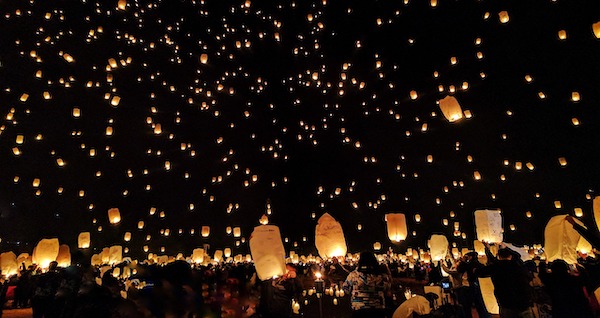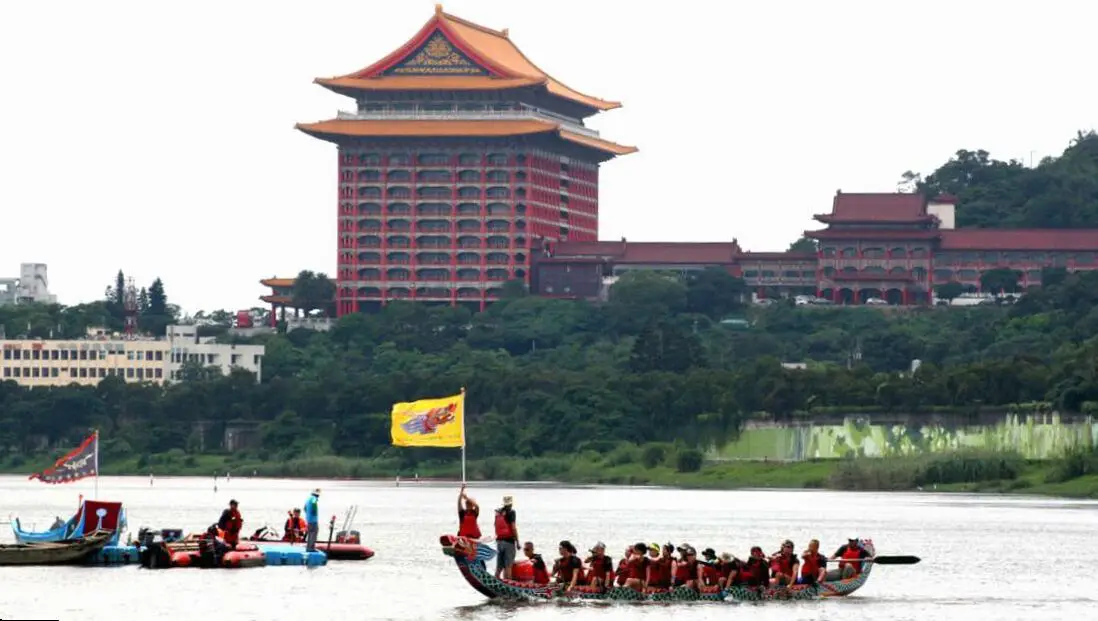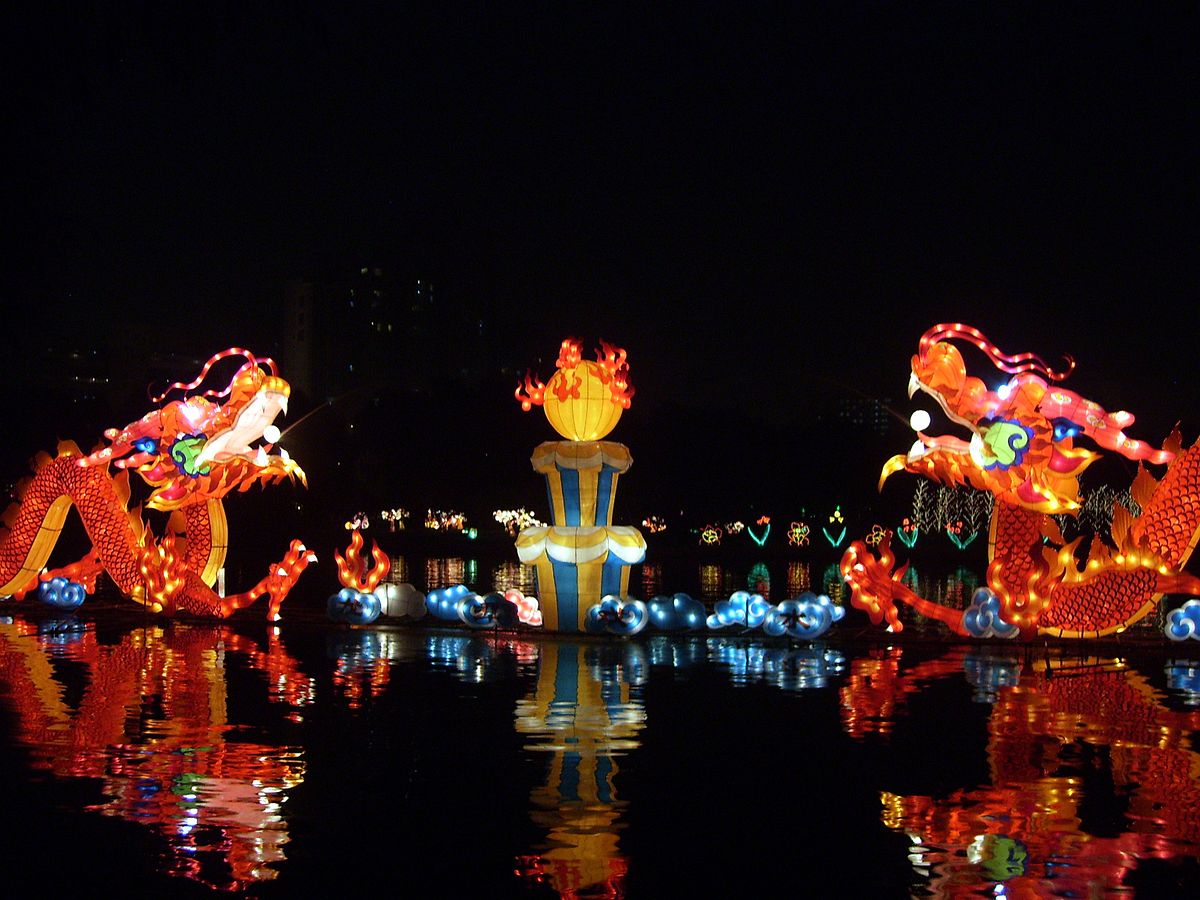TRADITIONAL FESTIVALS IN TAIWAN
Chinese New Year

The Chinese New Year, also known as the Spring Festival, is celebrated from the first to the fifth day of the first month of the Chinese lunar calendar. Literally, Chinese people refer to this festival as "passing the year," which means shooing out the old and welcoming the new; it is considered the most important Chinese holiday of the year. There are a number of related customs and traditions that go along with the festival. Normally, on the 23rd or 24th day of the last month of the Chinese lunar calendar, people sacrifice to the Hearth God and send him off on his annual journey to Heaven; this signals the start of the Chinese New Year holidays.
On the Chinese New Year's Eve, families complete their spring cleaning, signifying the sweeping away of the misfortunes of the previous year. After the spring cleaning, a New Year's cake is made (the cake is a symbol of "reaching new heights"). The second to last day of the last month of the Chinese lunar calendar is when families stick up spring couplets and New Year's prints on their doors and windows to bring good luck. On the last day of the last month of the Chinese lunar calendar, families gather together for a New Year's Eve dinner, called the "Gathering around the stove." Adults then give the younger members of the family, particularly children, red envelopes with cash inside.
Chinese New Year activities also include the practice of going around to friends and relatives to offer New Year's greetings on the 1st day of the Chinese New Year, visiting the wife's family on the 2nd day, welcoming the God of Wealth on the 4th day, and reopening business on the 5th day.
The Lantern Festival

The Lantern festival is also known as the "little New Year." Aside from the usual worship of the gods, the occasion involves guessing lantern riddles, eating rice-flour dumplings, and releasing lanterns into the sky in New Taipei City's Pingxi Township. The Yanshui Beehive Rocket Festival in Tainan County is another major event during the Lantern Festival. Colorful lanterns of all sizes and shapes have always been main attractions of the Lantern Festival, which is celebrated with a grand national festival and other major festivals in Taipei and Kaohsiung.

The Tourism Bureau has been holding the Taiwan Lantern Festival for years to attract visitors and raise the international profile of the cultural attractions of Taiwan. Traditionally, the festival has been celebrated by carrying hand lanterns. The Taiwan Lantern Festival adds a high-tech touch to this traditional custom and brings the event to the international stage. From the theme lantern displays to folk arts and performances, the festival has become a favorite of both locals and foreign visitors.
Dragon Boat Festival

Together with the Chinese New Year and the Mid-Autumn Moon Festival, the Dragon Boat Festival is one of Taiwan's three major annual traditional holidays. Because of its origins and customs, it is closely related to the remembrance of Qu Yuan, a poet who lived during the Warring States Period. That is why, from ancient times, people have also referred to the Dragon Boat Festival as the" Poet's Festival."
At the time of the Dragon Boat Festival, the most common customs are holding dragon boat races and eating glutinous rice dumplings called zongzi. Legend has it that when the poet Qu Yuan jumped to his death in the Miluo River, the local people rowed their boats to and fro in search of him. Later, this practice slowly evolved into the dragon boat races. Today, dragon boat races are a popular activity in Taiwan and abroad, and many local areas in Taiwan hold their own races. Every year, there is also an international dragon boat race with competing teams from Taiwan and abroad.
The practice of making zongzi came from the people who tried to save Qu Yuan from being eaten by fish by stuffing rice into bamboo sections and throwing them into the river to feed the fish. Today, the dumplings are wrapped in bamboo leaves and eaten by people.
Zhongyuan Festival
.jpg)
The seventh month of the Chinese lunar calendar is Ghost Month. Traditionally, it starts from dawn on the first day of the month, when the gates of the netherworld open, and ends on the 29th day of the month, when the gates close. During the festivities of the month, which reach a peak on the 15th day, people hold rituals to solicit salvation from disaster and misfortune.
Mid-Autumn Festival

The Mid-Autumn Festival, also called the Moon Festival, is the holiday with the most romantic atmosphere. Because this holiday occurs during the autumn, when the harvest season is over, people in earlier days chose this day to make offerings and thank the gods for the bountiful harvest. The celebration has become a time for families to get together. The most familiar myth concerning this festival is that Chang-e flying to the moon after secretly drinking her husband's elixir of life. Aside from this, there are also tales of the Jade Rabbit and of "Wu Gang chopping down the cassia tree."
Because most of the activities held on this holiday are related to the moon, it has come to be known as "Moon Day." Important activities at this time include eating moon cakes, which symbolize unity and togetherness; strolling under the full moon; and eating pomelos, since the Chinese term for pomelo sounds like "care and protection." The barbecuing that is so popular in Taiwan on this holiday is a recent custom is in which families and friends get together and enjoy a meal.
 GUIDANCE FOR INDONESIAN FOREIGNER IN TAIWAN
GUIDANCE FOR INDONESIAN FOREIGNER IN TAIWAN